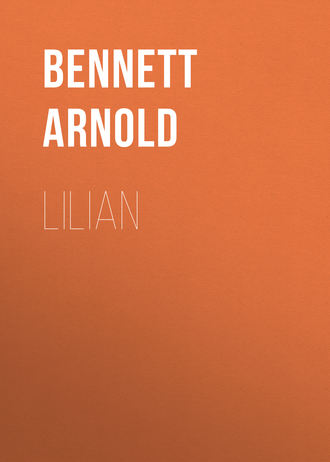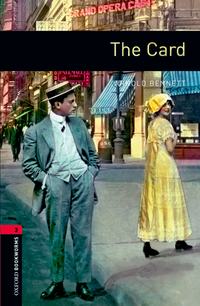 полная версия
полная версияLilian
V
The Devotee
It was after she had made some tea and was taking it, at her desk, without milk, but with a bun and a half left over from the previous afternoon's orgy of the small room clerks, that Lilian had the idea of a mighty and scarcely conceivable transgression, crime, depredation. None of the machines in the small room was in quite first-rate order. The machines were good, but they needed adjustment. Miss G. – the clerks referred to her as Miss G., instead of Miss Grig, when they were critical of her, which was often-was almost certainly a just woman, but she was mean, especially in the matter of wages; and she would always postpone rather too long the summoning of a mechanic to overhaul the typewriters. Such delay was, of course, disadvantageous to the office, but Miss G. was like that. Lilian, munching, inserted two sheets and a new carbon into her machine, and then pulled them out again with a swift swish. Why should she not abstract Miss G.'s own machine for the high purpose of typing Lord Mackworth's brilliant article? It was nearly a new one.
Miss G. was a first-rate typist. She typed all her own letters, and regularly at night even did copying; and she always had the star machine of the office. The one objection to Lilian's nefarious scheme was the fact that Miss G.'s machine ranked as the Ark of the Covenant, and the rule forbidding the profane to lay hands on it was absolute and awful. This rule was a necessity in the office, where every machine amounted to an individuality, and was loved or hated and shamelessly intrigued for or against. Lilian knew a little of Miss G.'s machine, for on Its purchase she had had the honour of trying it and reinforcing Miss G.'s favourable judgment upon it, her touch being lighter than Gertie Jackson's, that amiable, tedious hack, and similar to Miss G.'s touch.
Lilian feared lest her own machine might give a slip towards the end of a page, throw a line out of the straight and spoil the whole page. Miss G.'s machine was on the small desk beneath the window in the principals' room. Having reflected, she decided to sin. If Mr. Grig was awake she would tell him squarely that her own machine was out of gear, that all the clerks' machines were out of gear, and if he still objected-and he might, for he ever feared Miss G. – she would bewitch him. She would put his own theory of her powers into practice upon himself.
She would be quite unscrupulous; she would stop at nothing. She went forth excited on her raid. He was still asleep. He might waken; if he did, so much the worse; she must risk it. She regarded him with friendly condescension. She had work to do; she had a sense of responsibility; and she was doing the work. He, theoretically in charge of the office, slept, probably after a day chiefly idle-the grey-haired, charming, useless irresponsible. And were not all men asleep rather absurd? She picked up the heavy machine; one of its indiarubber shoes dropped off, but she left that where it lay-there were plenty to replace it in her room. Soundlessly she left the sleeper. Triumphant, unscrupulous, reckless, she did not care what might happen.
At work on the article, exulting in the smooth excellence of Miss G.'s machine, she felt strangely happy. She liked Felix to be asleep; she liked the obscure sensation of fatigue at the back of her brain; she liked to be alone in the night, amid a resting or roystering world; she liked the tension of concentrating on the work, the effort after perfection. The very machine itself, and the sounds of the machine, the feel of the paper, the faint hiss of the gas-stove, were all friendly and helpful. How different were her sensations then from her sensations in the pother and racket and friction of the daytime! She forgot that she was beautiful and born to enchant. She was oblivious of both the past and the future. A moral exaltation, sweet and gentle, inspired, upheld and exhilarated her.
She heard the outer door open. The threatened interruption annoyed her almost to exasperation. It was essential that she should not be interrupted, for she was like a poet in full flow of creation. Footsteps, someone moving hesitatingly to and fro in the anteroom! There was the word "Enquiries" painted in black on the glass panel of the small room, thrown into relief by the light within the room, and people had not the sense to see it. The public was really extraordinary. Even Lord Mackworth had not at first noticed it. Well, let whoever it might be find his way about unaided by her! She would not budge. If urgent work had arrived she did not want it, could not do it, and would not have it.
Then she caught voices. The visitor had got into the principals' room and wakened Mr. Grig. The voices were less audible now, but a conversation seemingly interminable was proceeding in the principals' room. The suspense vexed her and interfered with the fine execution of her task. She sighed, tapped her foot, and made sounds of protest with her tongue against her upper teeth. At length both Mr. Grig and the visitor emerged into the ante-room, still tirelessly gabbling. The visitor went, banging the outer door. Mr. Grig came into her room with a manuscript in his hand. Feigning absorption, she did not look up.
"Here's something wanted for eleven in the morning. It's going to be called for. Proof of a witness's evidence in a law case. Very urgent. It's pretty long. You'd better get on to it at once. Then one or two of them'll be able to finish it between nine and eleven."
Lilian accused him in her mind of merely imitating his sister's methods of organization and partition.
"I'm afraid I can't put this aside, Mr. Grig," she said gravely, uncompromisingly.
"What is it?"
"It's just come in."
"I never heard anybody," Felix snapped.
Lilian thought how queer and how unjust it was that she should be prevented by her inferior station from turning on him and bluntly informing him that he had been asleep instead of managing the office.
"It's an article by Lord Mackworth for to-morrow's Evening Standard, and it has to be at the Standard office by half-past eight, and I've promised to have it delivered at Jermyn Street by six-thirty."
"But who's going to deliver it?"
"I am, as I go home."
"But this is urgent too. And, what's more, I've definitely promised it," Mr. Grig protested, waving his manuscript somewhat forlornly. "What length's yours?"
"It's not the length. It has to be done with the greatest care."
"Yes, that's all very well, but-"
His attitude of helplessness touched her. She smiled in her serious manner.
"If you'll leave it to me to see to, Mr. Grig," she said soothingly, and yet a little superiorly, "I'll do the best I can. I'll start it, anyhow. And I'll leave an urgent note for Miss Jackson about it. After all, in two hours they ought to be able to do almost anything, and you know how reliable Miss Jackson is. Miss Grig always relies on her."
She held out her hand for the wretched manuscript. Mr. Grig yielded it up, pretending unwillingness and uneasiness, but in reality much relieved. A quarter of an hour later he returned to her room in overcoat and hat.
"I think I may as well go home now," said he, yawning enormously. "I'm a bit anxious about my sister. Nothing else likely to come in, is there? You'll be all right, I suppose."
"Me!" she exclaimed kindly. "Of course, Mr. Grig. I shall be perfectly all right."
She wondered whether he really was anxious about his sister. At any rate, he had not the stamina to sit up through all the night in the office. But she, Lilian, had. She was delighted to be alone again. She finished Lord Mackworth's article, read it and re-read it. Not a mistake. She bound it and stitched it. She entered the item in the night-book. She made out the bill. She typed the address on the envelope. Then, before fastening the envelope, she read through everything again. All these things she did with the greatest deliberation and nicety.
At the end she had ample time to make a start on the other work, but she could not or would not bring herself to the new task. She was content to write a note for Gertie Jackson, shifting all the responsibility on to Gertie. Gertie would have to fly round and make the others fly round. And if the work was late-what then? Lilian did not care. Her conscience seemed to have exhausted itself. She sat in a blissful trance. She recalled with satisfaction that she had said nothing to Felix about Lord Mackworth having called in person. She rose and wandered about the rooms, savouring the silent solitude. The telephone was in the principals' room. How awkward that might have been if Felix had stayed! But he had not stayed.
VI
The Telephone
"Hello, hello! Who is it?"
"Is that Regent 1067?"
"Yes."
"Is that Lord Mackworth?"
"Speaking. Who is it?"
"Grig's Typewriting Office. I'm so sorry to wake you up, but you asked us to. It's just past six o'clock."
"Thanks very much. Who is it speaking?"
"Grig's Typewriting Office."
"Yes. But your name? Miss-Miss-?"
"Oh! I see. Share. Share. Lilian Share… Not Spare, S-h-a-r-e."
"I've got it. Share. I recognized your voice, Miss Share. Well, it's most extraordinarily good-natured of you. Most. I can't thank you enough. Excuse me asking your name. I only wanted it so that I could thank you personally. Article finished?"
"It's all finished and ready to be delivered. It'll be dropped into your letter-box in about a quarter of an hour from now. You can rely on that."
"Then do you keep messengers hanging about all night for these jobs?"
"I'm going to deliver it myself; then I shall know it is delivered."
"D'you know, I half suspected all along you meant to do that. You oughtn't really to put yourself to so much trouble. I don't know how to thank you. I don't, really!"
"It's no trouble at all. It's on my way home."
"You're just going home, then? You must be very tired."
"Oh, no! I sleep in the daytime."
"Well, I hope you'll have a good day's rest." A laugh.
"And I hope now I've wakened you you won't turn over and go to sleep again." Another laugh, from the same end.
"No fear! I'm up now."
"I beg your pardon?"
"I'm up. Out of bed." A laugh from the Clifford Street end.
"Good-bye, then."
"Good-bye. And thanks again. By the way, you're putting the bill with it?"
"Oh, yes."
"And the carbon?"
"Yes. Good-bye."
"Good-bye, Miss Share."
Lilian hung up the receiver, smiling. And she continued to smile as she left the room and went to her own room and took her street things out of the cupboard and put them on. Nothing could have been more banal, more ordinary, and nothing more exquisite and romantic than the telephone conversation. The secret charm of it was inexplicable to her… She saw him standing in the blue-and-crimson pyjamas by the bedside, a form distinguished and powerful… She revelled in his gratitude. How nice of him to ask her name so that he might thank her personally! He did not care to thank a nameless employee. He wanted to thank somebody. And now she was somebody to him.
Perhaps she had not been well-advised to give him her Christian name. The word, however, had come out of itself. Moreover, she liked her Christian name, and she liked nice people to know it. She certainly ought not to have said "that" about his not turning over and going to sleep again. No. There was something "common" in it. But he had accepted the freedom in the right spirit, had not taken advantage of it.
She extinguished the gas-stove, restored the stolen typewriter, loosed the catch of the outer door, banged the door after her, and descended, holding the foolscap envelope in her shabbily-gloved hand. The forsaken solitude of the office was behind her.
Outside, an icy mist floated over wet pavements in the first dim, sinister unveiling of the London day! Lilian wore a thick, broad, woollen scarf which comforted her neck and bosom, and gave to beholders the absurd illusion that she was snugly enveloped; but the assaulting cold took her in the waist, and she shivered. Her feet began to feel damp immediately. There was the old watchman peeping out of his sentry-box by his glowing brazier! He recognized her quickly enough, and without a movement of the gnarled face held up her matchbox as a sign of the bond between them. How ridiculous to have classed him with burglars! She threw her head back and gave him a proud, bright and rather condescendingly gracious smile.
Along Clifford Street and all down Bond Street the heaped dustbins stood on the kerb waiting for the scavengers. In Piccadilly several Lyons' horse-vans, painted in Oxford and Cambridge blues, trotted sturdily eastwards; one of them was driven by a woman, wrapped in a great macintosh and perched high aloft with a boy beside her. Nothing else moving in the thoroughfare! The Ritz Hotel, formidable fortress of luxury, stood up arrogant like a Florentine palace, hiding all its costly secrets from the scorned mob. No. 6a Jermyn Street was just round the corner from St. James's Street: a narrow seven-storey building of flats, with a front-door as impassive and meaningless as the face of a footman. Lilian hesitated a moment and relinquished her packet into the brass-bordered letter-slit. She heard it fall. She turned away with a jerky gesture. She had not walked ten yards when a frightful lassitude and dejection attacked her with the suddenness of cholera. Scarcely could she command her limbs to move. The ineffable sadness, hopelessness, wretchedness, vanity of existence washed over her and beat her down. Only a very few could be glorious, and she was not and never could be of the few. She was shut out from brightness, – no better than a ragamuffin looking into a candy window.
She descended into the everlasting lamplit night of the Tube at Dover Street, where there was no dawn and no sunset. And all the employees, and all the meek, preoccupied travellers seemed to be her brothers and sisters in martyrdom. Her train was nearly empty; but the eastbound trains-train after train-were full of pathetic midgets urgently engaged upon the problem of making both ends meet. After Earl's Court the train ran up an incline into the whitening day. She got out at the next station, conveniently near to which she lodged.
The house was one of the heavily porched erections of the 'fifties and 'sixties, much fallen in prestige. The dirty kitchenmaid was giving the stone floor of the porch a lick and a promise, so that fortunately the front door stood open. Lilian had the tiny mean bedroom on the second floor over the hall; in New York it would have been termed a hall-bedroom. Nobody except the gawky, frowsy, stupid, good-natured maid had seen her. She shut her door and locked it. The room was colder even than the street. She looked into the mirror, which was so small that she had had to arrange a descending series of nails for it in order that piece by piece she might inspect the whole of herself. Her face was as pale as a corpse. Undressing and piling half her wardrobe on to the counterpane she slipped into the narrow bed, ravenous for sleep and oblivion, and drew the clothes right over her head. In an instant she was in a paradise of divine dreams.
PART II
I
The Suicide
The next morning Lilian left her lodging at the customary hour of 8.15, to join one of the hundreds of hastening, struggling, preoccupied processions of workers that converged upon central London. She had slept for ten hours without a break on the previous day, risen hungry to a confused and far too farinaceous tea, done some dressmaking by the warmth of an oil-stove, and gone to bed again for another enormous period of heavy slumber. She was well refreshed; her complexion was restored to its marvellous perfectness; and life seemed simpler, more promising, and more agreeably exciting than usual.
She had convinced herself that the Irish lord would call at the office in person to pay his bill; the mysterious and yet thoroughly understood code that governs certain human relations would forbid him either to post a cheque or to send his man with the money. Her only fear was that he might already have called. But even if he had already called, he would call and call again, on one good pretext or another, until … Anyhow they would meet… And so on, according to the inconsequent logic of day-dreams in the everlasting night of the Tube.
The dreamer had a seat in the train-one of the advantages of living near the terminus-but strap-hangers of both sexes swayed in clusters over her, and along the whole length of the car, and both the platforms were too densely populated. She could not read; nobody could read. As the train roared and shook through Down Street station, she jumped up to fight her way through straphangers towards the platform, in readiness to descend at Dover Street. On these early trains carrying serious people, if you sat quiet until the train came to your station you would assuredly be swept on to the next station. These trains taught you to meet the future half-way.
As it happened the train stopped about a hundred yards short of Dover Street, and would not move on. Seconds and minutes passed, and the stoppage became undeniably a breakdown. The tunnels under the earth from Dover Street back to Hammersmith were full of stopped trains a few hundred yards apart, and every train was full of serious people who positively had to be at a certain place at a certain time. Lilian's mood changed; the mood of the car changed, and of the train and of all the trains. No one knew anything; no one could do anything; the trains were each a prison. The railway company by its officials maintained a masterly silence as to the origin of the vast inconvenience and calamity. Rumours were born by spontaneous generation. A man within Lilian's hearing, hitherto one of God's quite minor achievements, was suddenly gifted with divination and announced that the electricians at the power station in Lots Road had gone on strike without notice and every electric train in London had been paralysed. Half an hour elapsed. The prisoners, made desperate by the prospect of the fate which attended them, spoke of revolution and homicide, well aware that they were just as capable of these things as a flock of sheep. Then, as inexplicably as it had stopped, the train started.
Two minutes later Lilian, with some scores of other girls, was running madly through Dover Street in vain pursuit of time lost and vanished. Not a soul had guessed the cause of the disaster, which, according to the evening papers, was due to an old, unhappy man who had wandered unobserved into the tunnel from Dover Street station with the ambition to discover for himself what the next world was like. This ambition had been gratified.
As Lilian, in a state of nervous exhaustion, flew on tired wings up the office stairs she of course had to compose herself into a semblance of bright, virginal freshness for the day's work, conformably with the employer's theory that until he reaches the office the employee has done and suffered nothing whatever. And Miss Grig was crossing the ante-room at the moment of Lilian's entry.
"You're twenty-five minutes late, Miss Share," said Miss Grig coldly. She looked very ill.
"So sorry, Miss Grig," Lilian answered with unprotesting humility, and offered no explanation.
Useless to explain! Useless to assert innocence and victimization! Excuses founded on the vagaries of trains were unacceptable in that office, as in thousands of offices. Employers refused to take the least interest in trains or other means of conveyance. One of the girls in the room called "the large room" had once told Lilian that, living at Ilford, she would leave home on foggy mornings at six o'clock in order to be sure of a prompt arrival in Clifford Street at nine o'clock, thus allowing three hours for little more than a dozen miles. But only in the book of doomsday was this detail entered to her credit. Miss Grig, even if she had heard of it-which she had not-would have dismissed it as of no importance. Yet Miss Grig was a just woman.
"Come into my room, Miss Share, will you, please?" said Miss Grig.
Lilian, apprehending she knew not what, thought to herself bitterly that lateness for a delicious shopping appointment or a heavenly appointment to lunch at the Savoy or to motor up the river-affairs of true importance-would have been laughed off as negligible, whereas lateness at this filthy office was equivalent to embezzlement. And she resolved anew, and with the most terrible determination, to escape at no matter what risks from the servitude and the famine of sentiment in which she existed.
II
The Malady
Miss Grig's Christian name was Isabel; it was somehow secret, and never heard in the office; and Felix, if he ever employed it, could only have done so in the sacred privacy of the principals' room. Like her brother, Miss Grig might have been almost any age, but only the malice of a prisonful of women could have seriously asserted her to be older than Felix. Although by general consent an authentic virgin, she had not the air of one. Rather full in figure, she was neither desiccated nor stiff, and when she moved her soft body took on flowing curves, so that clever and experienced observers could not resist the inference, almost certainly wrong, that in the historic past of Isabel lay hidden some Sabine episode or sublime folly of self-surrender. She had black hair, streaked with grey, and marvellous troubled, smouldering black eyes that seemed to yearn and appeal. And yet in an occasional gesture and tone she would become masculine.
She went wrong in the matter of clothes, aspiring after elegance and missing it through a fundamental lack of distinction, and also through inability to concentrate her effects. Her dresses consisted of ten thousand details held together by no unity of conception. Thin gold chains wandered, apparently purposeless, over her rich form; they would disappear like a railway in a cutting and then pop out unexpectedly in another part of the lush rolling countryside. The contours of her visible garments gave the impression that the concealed system of underskirts, cache-corsets, corsets, lingerie, hose and suspenders was of the most complicated, innumerable and unprecedented variety. And indeed she was one of those women who, for the performance of the morning and the evening rites, trebly secure themselves by locks and bolts and blinds from the slightest chance of a chance of the peril of the world's gaze.
The purchase of the typewriting business by Felix had changed Miss Grig's life from top to bottom. It had transformed her from a relic festering in sloth and frustration into the eager devotee of a sane and unassailable cult. The business was her perversity, her passion. It was her mystic husband, fecundating her with vital juices, the spouse to whom she joyously gave long nights of love. Apart from the business, and possibly her brother, she had no real thoughts. The concern as it existed in Lilian's time was her creation. She would sacrifice anything to it, her own health and life, even the lives and health of tender girls. Yes, and she would sacrifice her conscience to it. She would cheat for it. The charges for typewriting were high-for she had established a tradition of the highest-class work and rates to match-but this did not prevent her from seizing any excuse to inflate the bills. The staff said that her malpractices sufficed every year to pay the rent. And she was never more priestess-like, more lofty and grandiose, than when falsifying an account.
Lilian found her seated alone in fluent dignity at the great desk.
"Yes, Miss Grig?"
"May I enquire," asked Miss Grig in grave accents not of reproach but of pain, "why you did not put in an appearance yesterday, Miss Share?"
"Well, madam," Lilian answered with surprise and gentle rebuttal, "I stayed here all the night before and I was so tired I slept all day. I didn't wake up until it would have been too late to come."
"But you knew I was unwell, and that I should count on you upper girls to fill my place. Or you should have known. What if you were tired? You are young and strong; you could have stood it easily enough, and there was much work to be done. In a crisis we don't think about being tired. We just keep on. And even if you did sleep all day, I suppose it never occurred to you in the evening that someone would be needed to take charge during last night. The least you could have done would have been to run up and see how things were. But no! You didn't even do that! Shall I tell you who did take charge last night? Miss Jackson. She'd been on duty the whole day yesterday. She stayed all night till six o'clock. And she was back again at nine o'clock this morning-twenty-five minutes before you. And when I told her to go back home, she positively refused. She defied me. That's what I call the true spirit, my dear Lilian."









